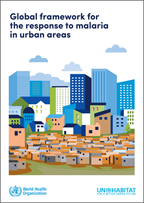Webinar hosted by WHO and UN-Habitat
/malaria/houses.png?sfvrsn=e47e3398_2)
By 2050, nearly 7 out of 10 people globally will live in cities and other urban settings. Although many will benefit from their urban status, rapid and unplanned urbanization can have negative social and environmental health impacts, particularly on the poorest and most vulnerable.
While urbanization, overall, is expected to reduce malaria transmission, unplanned urbanization will likely result in a malaria disease burden that is disproportionately high among the urban poor. Invasive mosquito species that adapt easily to urban environments, such as Anopheles stephensi, can also increase the risk of malaria in these settings.
Cities are uniquely positioned to understand local needs, convene coalitions, and respond rapidly to changing conditions to safeguard health. These changes require strong city leadership to implement multi-sectoral, health-relevant policies and public services. The response to malaria and other vector-borne diseases must be integrated into such policies and processes.
Commemorating World Cities Day on 31 October 2022, WHO and the United Nations Human Settlements Programme (UN-Habitat) are jointly organizing a webinar to launch the new "Global framework for the response to malaria in urban areas". The framework provides guidance to city governments, health programmers, urban planners and communities as they respond to the challenges of rapid urbanization in a targeted way.
Date: Monday 31 October, World Cities Day
Time: 15:00 – 16:30 CET / 9:00 – 10:30 EST
Languages: English with simultaneous interpretation to French and Spanish
Programme
15:00 – Opening by webinar chairs
- Dr Nathalie Roebbel, Unit Head, Urban Health, WHO
- Dr Graham Alabaster, Head of Geneva Office, UN-Habitat
15:05 – Message from the Mayor of Freetown, Ms Yvonne Aki-Sawyerr OBE
15:10 – Presentation of the “Global framework for the response to malaria in urban areas”
- Dr Abdisalan Noor, Head of Unit, Strategic Information for Response, Global Malaria Programme, WHO
15:20 – Reflections from UN-Habitat, the RBM Partnership and WHO
- Dr Graham Alabaster, Representative of the Executive Director, UN-Habitat
- Dr Corine Karema, Interim CEO, RBM Partnership to End Malaria
- Dr Etienne Krug, Director, WHO Department of Social Determinants of Health
- Dr Raman Velayudhan, Director a.i., WHO Department for the Control of Neglected Tropical Diseases
15h40 – Applying an urban health lens to integrated approaches to address neglected, tropical, and vector-borne diseases
- Dr Neeraj Dhingra, Former Director, National Vector Borne Disease Control Program, India
- Professor Steven Lindsay, The Lancet Commission on dengue and other Aedes-transmitted viral diseases
- Dr José Siri, WHO consultant, Urban Health team
16h00 – Moderated discussion
16:25 – Wrap-up / closing
Video recordings

/multimedia/image-recording-urban-malaria-webinar-eng.tmb-479v.png?sfvrsn=ffa0c4d8_4)
/multimedia/image-recording-urban-malaria-webinar-fre42cc0078e90f4495b80702e48b9054e9.tmb-479v.png?sfvrsn=ae00ca95_1)
/multimedia/image-recording-urban-malaria-webinar-spa.tmb-479v.png?sfvrsn=ff469855_2)
